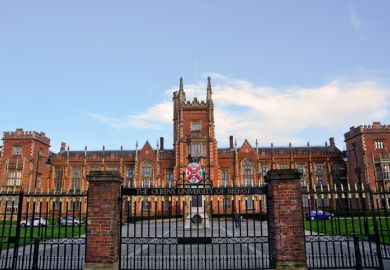The news that the government is looking to develop a new network of specialist post-16 Mathematics schools is one that we at Exeter wholeheartedly welcome.
As a founding partner and sponsor of Exeter Mathematics School we have already seen how specialist provision can multiply excellence in maths.
Sir Adrian Smith’s review of post-16 mathematics last year clearly articulated the increasing demand for mathematics skills across all levels of the labour market. The UK is an advanced knowledge economy and we need more skills in maths to thrive as a nation, and to prepare students for the jobs of the future. Specialist mathematics schools are part of the answer. The world-class education they provide is one way the UK can tackle the shortage of workers with skills in maths, science, engineering and technology, and indeed in every quantitative occupation.
There are currently two specialist, university-sponsored, mathematics schools in the country: Exeter Mathematics School (EMS) and its counterpart, Kings College London Mathematics School (KCLMS).
The two schools serve very different populations. Based in Exeter, EMS caters for young people in the South West across Devon, Cornwall, Dorset and Somerset, a primarily rural and coastal region with a total population of approximately 3.2 million. Meanwhile, KCLMS is set in the heart of London with a population pushing 8.8 million.
The contexts may differ but both schools have shown that the model works and that specialised provision can be a great environment to nurture our nation’s top mathematical talent. In 2017, 98% of EMS students progressed to university with over 50 per cent obtaining places to study at Russell Group institutions including Oxford and Cambridge. KCLMS had similarly high levels of progression, including 23 per cent to Oxbridge.
If new schools have the same ingredients as Exeter and Kings - high-quality long-term involvement from a university with a strong mathematics department - then the benefits we have seen so far will be multiplied.
Exeter Mathematics School - sponsored by Exeter College and the University of Exeter – was set up to educate and meet the needs of able and enthusiastic young mathematicians in the South West. EMS has approximately 120 students in year 12 and 13 and has a strong social mobility mission. As a third of students live too far away to commute, they stay at the school during the week, living together in flats with pastoral support. During a typical day students will be working hard researching topics such as the physics of space colonization. By night they’re learning how to do laundry and to cook for each other.
Despite only opening in 2014 EMS is already one of the top performing state schools in the country through its last two graduating cohorts. Last summer 81 per cent of exams taken by students were graded as A*, A or B. The school is ranked in the top 20 state schools for average grades achieved by students aged 18 (19th) and for the percentage of students getting A-level grades of AAB or higher (16th).
Colleagues from both the University and the College work closely with EMS staff to develop all aspects of the school from organisation and governance to the curriculum. Both schools at Exeter and Kings also involve employers, industry and business to provide real-world insights and challenges for students. This partnership approach means students can experience university life, and study degree-level curriculum.
This includes the Exeter Mathematics Certificate (EMC), a course studied by all students at EMS designed to bridge the gap between secondary school mathematics and undergraduate study which includes degree-level research projects, highly valued by universities. Throughout this course, students develop research, public speaking, programming and presentation skills. Kings deliver their own version.
Exeter Mathematics School has a focus on supporting the most able in the region and its student body comes from some of the poorest parts of the South West. Many students who have embarked to study maths, physics and computer science are the first in their families to go to university. Some have been in local authority care. Last year, 36 per cent and half of those boarding at the school were from educationally disadvantaged backgrounds. The schools are also working to promote uptake from female students who make up a third of those studying at EMS.
Specialist mathematics schools also have wider benefits. EMS clearly benefits its students, but its mission filters through to other schools in the region and the wider community. EMS teachers provide training in physics and maths for colleagues in other schools who do not have an academic background in these areas, and postgraduate maths training with our Graduate School of Education.
Academics and teachers run the Maths Student Community, a programme for 130 keen students in Years 8 to 11 in schools in the region. There is a similar community for physics and also after-school enrichment courses. The school hosts a residential programme in the summer holidays where Year 10 students can develop their abilities in maths and physics with teachers from the school and lecturers from the University of Exeter.
The school is a hub for the Royal Institution Primary and Secondary School Masterclasses, held after school or on Saturdays. It’s also important to highlight that the impact of these activities has helped to increase participation in maths more generally within the region, with co-sponsor Exeter College also seeing an increase in applications to study maths at A-level.
The specialist mathematics school model is already working to increase maths excellence. The creation of a network of specialist mathematics schools with university partners across the UK will multiply these benefits. Today’s announcement is the start of an exciting new era for maths; one in which will see the UK’s maths excellence multiplied.
Joining up these schools with other excellent initiatives in mathematics education such as regional Mathematics Hubs, the national charity Mathematics, Education Innovation (MEI) and the Institute of Mathematics could make the benefit exponential.
Janice Kay is provost and senior deputy vice-chancellor at the University of Exeter
Register to continue
Why register?
- Registration is free and only takes a moment
- Once registered, you can read 3 articles a month
- Sign up for our newsletter
Subscribe
Or subscribe for unlimited access to:
- Unlimited access to news, views, insights & reviews
- Digital editions
- Digital access to THE’s university and college rankings analysis
Already registered or a current subscriber?







